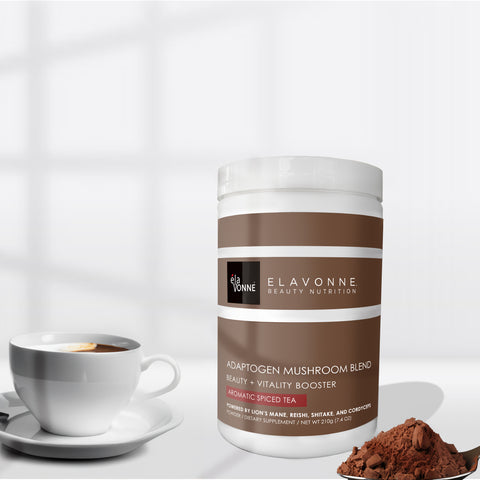Top 5 Hormone Balance Killers for Women Over 35 : And How to Help
As women enter their mid-thirties and beyond, managing the symptoms of aging, particularly those related to hormonal imbalances, becomes increasingly important. Hormones play a crucial role in overall well-being, and understanding how to maintain their balance is key to staying energetic, mentally sharp, and feeling rejuvenated. In this blog post, we'll explore common lifestyle factors that can disrupt hormonal balance and provide practical advice for maintaining it.
While causes of hormone imbalance can come from multiple factors, including those we can’t change, like aging, these are the top culprits you can control in your life. Especially for women over 35, addressing these areas of your life, to help swing your hormones back to normal and set you up for healthy aging.
Top 5 Lifestyle Factors That Throw Off Your Hormone Balance
Let's delve into these lifestyle factors that can disrupt our precious hormonal balance. It is important to note that these factors are not solely exclusive to women over 35, but can affect individuals of any gender and age. Recognizing and understanding these disruptors can be a monumental step towards reclaiming control over your body's natural rhythms and functions. In the following section, we will identify these factors and provide practical strategies to counteract their effects.
1. Managing Weight: Excess body fat can disrupt hormonal balance.
2. Regular Exercise: Exercise regulates several important hormones and should be a part of your daily routine, even if you're slim. It stimulates endorphins (‘feel-good hormones’) and improves insulin sensitivity among a cascade of other benefits.
3. Stress Management: Chronic stress elevates cortisol levels, affecting overall well-being. Stress reduction techniques, alongside a balanced diet and possibly supplements, can help maintain hormonal balance.
4. Healthy Diet: Diet plays a significant role in hormone health. Adding healthy fats, lean protein, and nutrient-rich foods supports hormone production and function. Limiting exposure to harmful chemicals and xenoestrogens is important. Opt for natural products and organic foods when possible.
5. Adequate Sleep: Quality sleep is essential for hormonal regulation. Establish a regular sleep schedule and create a calming bedtime routine to promote restful sleep.
Each of these factors has a distinct impact on hormonal balance, now, let's break them down further and get into the details a bit more...
Overweight and its Effects on Hormones
Being overweight can significantly affect the body's hormone balance. Fat cells produce estrogen, and excess estrogen can lead to problems like irregular periods, heavy bleeding, and other reproductive issues in women. Additionally, excess body weight often associates with insulin resistance. This can result in conditions like Polycystic Ovary Syndrome (PCOS). Weight management through a healthful diet and regular physical activity is critical in maintaining hormone balance. It's always advisable to consult with a healthcare provider or a nutritionist to establish a sustainable weight management plan tailored to your individual needs.
Lack of Exercise and its Cascade-Impacts on Hormones
A sedentary lifestyle can trigger a slew of health problems, many of which are related to hormonal imbalances. Exercise is vital in regulating several important hormones in the body, including endorphins, insulin, and sex hormones. Regular physical activity helps to improve insulin sensitivity and regulate the sleep-wake cycle, impacting melatonin levels. The type and intensity of exercise should be tailored to individual preferences and health status, and it's recommended to consult with a healthcare provider before beginning a new exercise regimen.

Overexposure to Toxins and the Emergence of Xenoestrogens
Exposure to harmful substances, such as smoking and certain chemicals, can disrupt natural hormone functions. Xenoestrogens, found in everyday items like plastic bottles and pesticides, can mimic estrogen and lead to health problems. To reduce exposure to these substances, it is advisable to use natural products, choose organically grown food, and opt for glass or stainless steel containers. However, the actual health impact of xenoestrogens can vary, and it is important to consider this in the context of overall exposure and lifestyle habits.
Lack of Sleep and its Detrimental Effects on Hormones
Inadequate sleep can significantly disrupt hormonal balance, elevating cortisol levels and affecting hunger hormones, leptin and ghrelin. Sleep deprivation also hampers the production of growth hormone. To maintain hormonal balance, aim for 7-9 hours of quality sleep each night, keep a regular sleep schedule, and ensure a calm sleep environment. If sleep issues persist, it is essential to consult a healthcare professional.
Balance Your Estrogen and Progesterone with Diet
The diet can significantly impact estrogen and progesterone levels. Incorporating healthy fats, omega-3 fatty acids, and reducing caffeine and alcohol consumption can aid in balancing these hormones. Including healthy amounts of lean protein, especially collagen, is also beneficial. It's important to remember that dietary needs may vary, and consulting with a healthcare provider or a nutritionist is advisable for personalized advice.
A Hormone Healthy Diet: Foods that Foster Balance
A diet that promotes hormonal health is centered around nutrient-dense foods that support hormone production and function. This includes healthy fats, quality proteins, and a variety of fruits, vegetables, and other collagen boosters. Individual dietary needs can vary, so it's a good idea to seek professional guidance for a diet that suits your specific circumstances.
Understanding the Role of Healthy Fats in Hormonal Balance
Healthy fats, like those found in fish oil and certain plant oils, are crucial for hormonal health and aging skin health. Regular intake of these fats can help balance estrogen and progesterone levels, contributing to overall health and wellness.

The Role of Collagen Protein in Hormone Balance
Collagen, essential for hormone production, supports gut health, which is directly linked to hormone regulation. Including collagen in your diet can help maintain hormonal balance and support overall well-being. Elavonne offers two pure collagen supplements that fit a healthy diet and lifestyle: Amino Collagen C, a marine collagen, and Vanilla Collagen Creamer + MCT Oil, a grass-fed bovine peptide supplement with the added benefit of healthy MCT fats.
Incorporating Lifestyle Changes for Hormonal Balance
By making adjustments in diet and lifestyle, you can support your body’s natural hormone production. This includes consuming healthy fats and omega-3s, and including lean protein, especially collagen, in your diet. It's essential to approach these changes holistically and consult a healthcare provider for guidance tailored to your specific health needs.
The Role of Maca in Supporting Female Hormones
Maca root, a natural herb native to Peru, is gaining recognition for its potential in supporting female hormonal balance. Revered as an adaptogen, maca is believed to aid the body in adapting to stressors, including hormonal fluctuations. Its rich composition of vitamins, minerals, and phytochemicals may contribute to regulating the endocrine system, which oversees hormone production. Particularly noteworthy for women experiencing menopause, maca has been studied for its ability to alleviate common symptoms such as hot flashes and mood swings, potentially by stabilizing hormone levels during this transition. Elavonne's Adaptogen Mushroom Blend incorporates maca root along with a range of antioxidants and functional mushrooms, creating a tasty, comprehensive dietary supplement tea that supports overall health and wellness.

Elavonne's Adaptogen Mushroom Blend provides adaptogens like maca root and ginseng, along with the benefits of functional mushrooms for healthy hormone balance.
Certain herbs and superfoods can support hormonal health. These include:
- Turmeric: Offers various health benefits, including normalizing inflammation.
- Betaine: Found in whole grains and beets, aids in detoxification.
- Chaste Tree (Berry): Regulates and supports the pituitary gland.
- Passion Flower (Passiflora incarnata): Can alleviate menopausal symptoms and maintains androgen levels.
- Rosemary: Addresses fatigue and mood swings associated with hormone imbalance.
- Wild Yam: May stimulate the production of progesterone and DHEA.
- Red Clover: Can help in managing hot flashes and insomnia.
- Kudzu Root: Assists in cognitive function and may alleviate vaginal dryness in postmenopausal women.
These ingredients support the body’s natural production of hormones and can be a part of a balanced approach to hormonal health. However, it's important to use these supplements under the guidance of a healthcare professional, as individual responses to supplements can vary.
The Synergy of Diet, Lifestyle, and Natural Supplements for Hormonal Balance
In conclusion, maintaining hormonal balance is a multifaceted endeavor that necessitates dietary changes, lifestyle modifications, and can be supported with the appropriate use of quality supplements and herbs. Through the incorporation of hormone-friendly foods, lifestyle practices, and high-quality supplements, you can support hormonal harmony. Remember, every individual's needs are unique, and it is essential to seek professional guidance to ensure your choices suit your specific circumstances. Achieving hormonal balance is integral to overall health and wellness, enhancing vitality and optimizing life quality.


